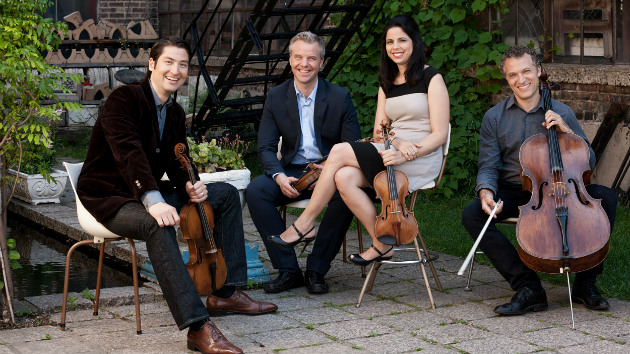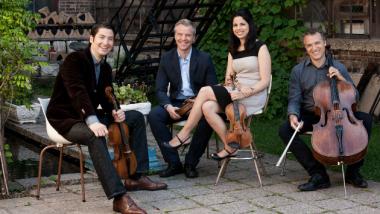
The Pacifica Quartet were locked in — with their eyes — at a performance at the Green Music Center's Weill Hall on Sunday, Dec. 13. The quartet seemed to spend more time looking at each other’s eyes and bows than at the score, a strategy that ensured perfect synchronicity and coherence in everything they played.
This ocular interaction was nowhere more evident than in Leoš Janacek’s “Intimate Letters” String Quartet No. 2, which closed the first half. Both the second violinist, Sibbi Bernhardsson, and the cellist, Brandon Vamos, stared like raptors at the first violinist Simin Ganatra, perhaps to steady themselves for Janacek’s raucous carousing.
Pacifica was as precise as they come. The entries were always spot-on, the dynamics scrupulously observed, the most important voice always at the forefront. The only fault in this magnificent collaboration was an occasional lapse in intonation, usually from the first violin. On the other hand, the parts, especially of the Janacek, are so difficult that lapses are to be expected.
The program opened with Beethoven’s last quartet, in F Major, Op. 135. The violist, Masumi Per Rostad, set the mood with a liquescent rendition of the first movement’s six-note opening motif. Subsequent iterations by the rest of the quartet were played with the utmost delicacy, with each instrument distinct. The feeling was joyous and energetic. First violinist Ganatra was particularly engaged, smiling at each of her entries and lifting her feet as a bodily expression of each phrase.
First violinist Ganatra was particularly engaged, smiling at each of her entries and lifting her feet as a bodily expression of each phrase. As she held a note, her right foot slowly descended, the cutoff coming as the foot made contact with the floor.
Op. 135 was written shortly before Beethoven’s death, and the Pacifica caught his reflective moods in all four movements. The first was joyous and conversational, the second a happy romp, the third an interlude of serene peace, the finale a triumphant affirmation of life.
The Janacek quartet retells the story of the composer’s unrequited love affair with a married woman almost 40 years younger than his 63. Each movement recounts an aspect of their “affair,” from his first sight of her, to a sojourn at a spa, to a musical portrait of her image, to a final reckoning that mixes anxiety and ultimate fulfillment.
The viola, which represents the woman, dominates the quartet, and violist Rostad proved more than equal to the task. He played the ethereal opening ponticello (at the bridge) phrase impeccably and then launched into a spirited rendition of the young woman’s changing moods. The rest of the quartet followed along, but this time Ganatra’s smiles were replaced by gritted teeth. Janacek makes extraordinary demands on each player, requiring them to shift moods on the head of a pin and accelerate to blistering prestissimos without any notice. Again, the only problem was the intonation, which became a bit ragged in the rollicking finale.
Not content with playing two masterpieces, the Pacifica offered the Brahms piano quintet in the second half, with the elegant pianist Orion Weiss. This work not only tests the quartet’s interpretive skills but also the mutual ability of pianist and quartet to blend. Both sides of this equation worked to perfection, with Weiss showing an uncanny feeling for when to lay back and when to soar. Everyone was audible, with nary a drowned note.
The quintet was so expertly played that after a certain point one heard only Brahms. The music itself outweighed any other aspect of the performance, and the musicians seemed to be pulled along by an ineluctable force. The mystery of the opening movement gave way to the lullaby of the second, the relentless energy of the third, and then to another triumphant conclusion.
At this concert, everything was triumphant, from the opening note to the last.

